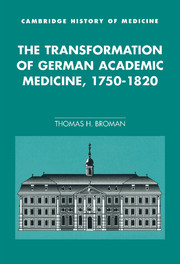Book contents
- Frontmatter
- Contents
- Acknowledgments
- Introduction
- 1 Physicians in eighteenth-century Germany
- 2 Fractures and new alignments
- 3 Physicians and writers: Medical theory and the emergence of the public sphere
- 4 The art of healing
- 5 Breaking the shackles of history: The Brunonian revolution in Germany
- 6 German academic medicine during the reform era
- Conclusion: Disciplines, professions, and the public sphere
- Index
- Cambridge History of Medicine
3 - Physicians and writers: Medical theory and the emergence of the public sphere
Published online by Cambridge University Press: 30 September 2009
- Frontmatter
- Contents
- Acknowledgments
- Introduction
- 1 Physicians in eighteenth-century Germany
- 2 Fractures and new alignments
- 3 Physicians and writers: Medical theory and the emergence of the public sphere
- 4 The art of healing
- 5 Breaking the shackles of history: The Brunonian revolution in Germany
- 6 German academic medicine during the reform era
- Conclusion: Disciplines, professions, and the public sphere
- Index
- Cambridge History of Medicine
Summary
The previous chapter described how the eighteenth-century medical profession was shaped by (and in turn gave form to) reformist impulses that were proclaimed under the banners of Enlightenment, social welfare, and the pragmatic uses of knowledge. The responses formulated by physicians to those impulses, as that chapter suggested, were a complex amalgam of defensive and offensive postures. At the most general level, those responses were structured by two issues. The first issue, hinted at by the discussion of Bildung, consisted of how someone conceived of the profession's relationship to the state. Did medicine exist to promote the state's enlightened ends (for example, by means of public health), or should physicians stake their identity on a more individual and personal level, for example in terms of their selfless service to patients, or their claim to cultivation of personal freedom through Bildung? The second issue concerned physicians’ sense of the relationship between theory and practice in medicine. Should theory be cultivated with an eye toward its application at the bedside, or could medical theory rightly lay claim to being a profound inquiry into the mysteries of organic nature? How in fact did bedside practice represent an “application” of a physician's theoretical knowledge?
Two points must be made to clarify these issues. First, in some ways their presentation as choices between alternatives is deceptive, because they did not necessarily represent mutually contradictory stances.
- Type
- Chapter
- Information
- The Transformation of German Academic Medicine, 1750–1820 , pp. 73 - 101Publisher: Cambridge University PressPrint publication year: 1996



